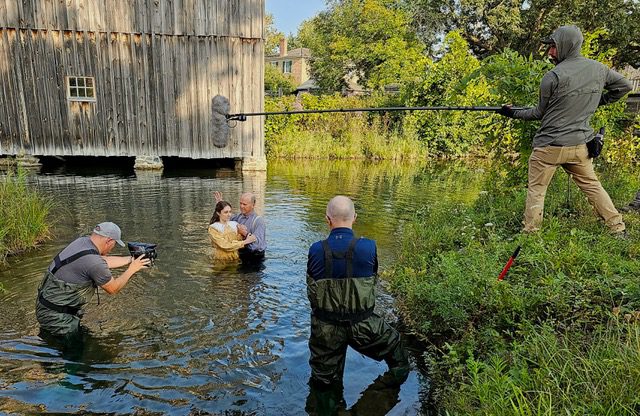
I saw this title (or something like it) on a Latter-day Saint-related message board. I never read through the thread there and, now, I probably wouldn’t be able to find it. But I once posted something on this subject and have been attacked ever since for what I said, by people who plainly didn’t understand what I said. So I thought, What the heck? I’ll try it again.
Yes, there can be valid criticisms of the Church. Both of the Church as an assemblage of people and of the Church as an institution.
To choose a few trivial examples:
We, as Saints, could and should be doing better at ministering, attending the temple more often, be more active missionaries, be better at family history research, be more charitable in our behavior, be more service-oriented. (If nobody else in the Church is defective in those areas, I certainly am. Which means that, even if I’m the only one, the Church membership isn’t living up to its full potential.) More of our youth should be serving as missionaries. Our musical and artistic tastes might be better. Our movie-going and novel-reading preferences might be more consistent with our values, more elevated. We should ourselves generate better literature and movies and art. (Please support Six Days in August! We’re trying, at least.)
As far as the Church itself goes: The Lord himself has been critical of it from time to time, as have its leaders. But here are some fairly insignificant criticisms that I myself have offered: Our art and architecture have sometimes been pretty uninspiring. Our Sunday school and other manuals have often been quite uninteresting. Our meetings are sometimes boring. (And so forth.)
(I expect that some readers will want me to share some more serious areas of disagreement with Church leaders and some weightier criticisms. I’m afraid that I’ll have to disappoint them. I’m not going to be lured into public attacks on my church. And anyway, [a] that’s not the point of this post and [b] I don’t really have any truly serious criticisms or areas of disagreement. I am, to use the silly language favored by one faction of critics, a “chapel Mormon.” Mainstream and orthodox. Not for the sake of being mainstream and orthodox but simply because that’s what I actually believe.)
Here, though, is the more serious question that some really want to ask:
Can there be any valid evidence against the Church?
To which my answer is No, there cannot.
This is the point at which some of my critics began to froth years ago, and over which some continue to wax occasionally indignant still today. So permit me to explain:
My answer presumes the Church to be true. Why? Because I believe it to be. (The question is about my personal opinion on the matter, right?)
Since the Church is ex hypothesi true, there can be no genuine evidence that it is false. There can, of course, obviously be seeming evidence against its claims, evidence that reasonable people might well regard as genuine and damning. In the end, though, on the assumption that the claims of the Church are true, what seems to be genuinely damning evidence against it must ultimately prove not to be such.
There is evidence that parallel rails on a train track converge in the distance. However, they don’t actually converge at a distance; they remain parallel. The visual evidence that they converge proves to be illusory.
There is evidence that the Sun goes around the Earth. For millennia, close watchers of the sky thought that it did, and they had reasons for thinking so. However, we can now explain those reasons, that evidence, in other ways.
There might be evidence strongly suggesting that Frank killed Bob. But if, in fact, it was Jim who killed Bob, and not Frank, the evidence suggesting that Frank was the murderer must eventually be reinterpreted as demonstrating no such thing.
It’s in that sense that I say that there can, in the end, be no valid evidence against the claims of the Restoration and the Restored Church. Ultimately, you see, there can never be proof that something that is true is actually false.
Now, before closing, I need to make a few points:
I’m not advocating a closed mind. I’m not saying that I refuse to consider evidence contrary to my religious beliefs. I’m not saying that there are no substantial arguments against the Restoration that deserve consideration. I’m not saying that every objection has been answered to the satisfaction of every rational and honest mind. I am saying that my conviction that the claims of the Restoration are true entails the corollary conviction that arguments against its truth are, in the end, wrong.
I hope that helps. Though I really doubt that it will help some folks in certain circles of my critics.
Good critics can be a blessing. As a grinding wheel sharpens a knife, they can (and often do) sharpen arguments and help to clarify propositions.
Incompetent critics, by contrast — e.g., those who regularly, grossly misread what their opponents say and who fail to grasp arguments and issues — are pretty much useless and a waste of time. Unfortunately, though, they’re both prolific and extremely vocal, across the web. It takes real discipline to ignore them. Discipline that I’ve too often lacked. As the saying goes, I’m a work in progress.

Given the public opposition and the rotten media treatment that our temples have been receiving of late — along with the rotten attention that we’re receiving from Hollywood — this item from the Coeur d’Alene/Post Falls Press comes as a relief and an absolutely wonderful and unexpected change of pace: “EDITORIAL: Temple will be blessing to community”
What a horrible thought that is! But here’s something from the Christopher Hitchens Memorial “How Religion Poisons Everything” File™ that’s just about guaranteed to give certain of my readers dyspepsia: “Self-Reliance Profiles: Baker Learns Better Business Practices: ‘Starting and Growing My Business’ course from the Church helps people set goals, learn principles”













